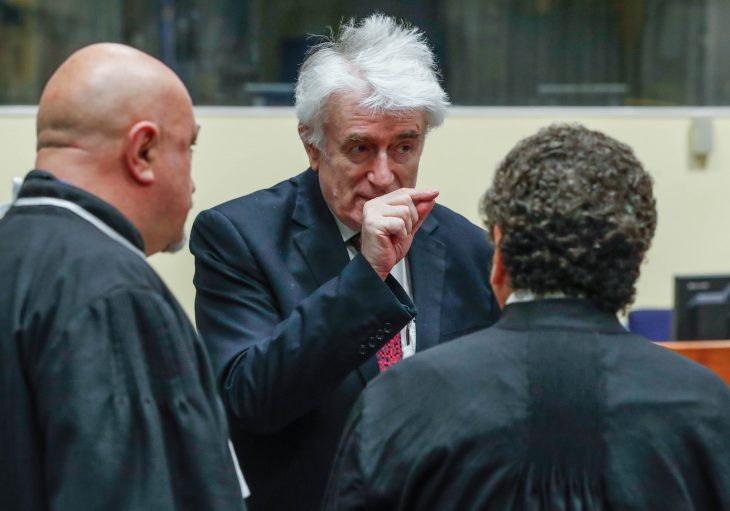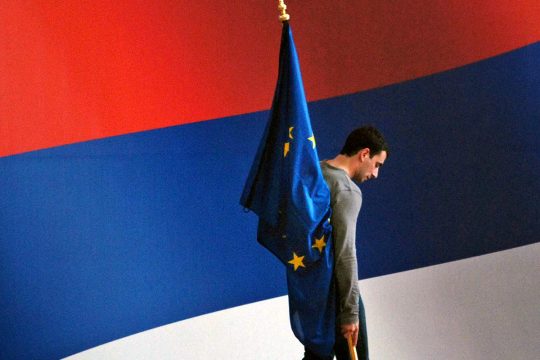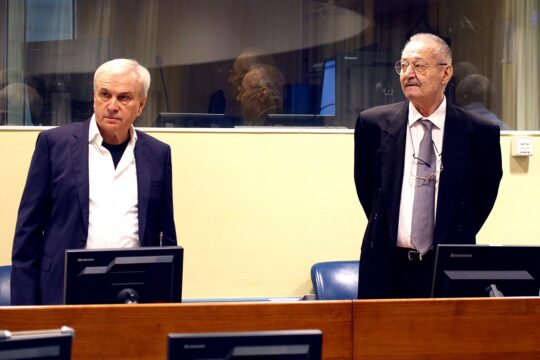Once-feared Bosnian Serb leader Radovan Karadzic Monday urged UN judges to overturn his conviction for war crimes during the Balkans conflict, and either acquit him or order a new trial.
Appearing at the start of his two-day appeal dressed in a dark suit and red tie, Karadzic, 72, smiled and greeted his defence team in the tribunal in The Hague.
He was sentenced to 40 years behind bars in March 2016 for the bloodshed committed during the Balkan country's three-year war from 1992-1995 which killed 100,000 people and left 2.2 million others homeless.
Once the most powerful Bosnian Serb leader, he became the highest ranked person to be convicted and sentenced at the International Criminal Tribunal for the Former Yugoslavia (ICTY), after former Serbian president Slobodan Milosevic died while on trial.
But Karadzic has lodged 50 grounds of appeal, maintaining to the Mechanism for International Criminal Tribunals (MICT) -- which has taken over from the ICTY -- that he was not given a fair trial.
"We're here today to ask you to overturn Radovan Karadzic's conviction and to order a new trial," defence lawyer Peter Robinson said, revealing that his client would address the court later Monday.
The right to a fair trial was a "universal value" of international justice, Robinson said, denouncing what he termed Karadzic's original "unwieldly, mega trial."
At the heart of the defence's appeal is the fact that Karadzic had to choose between either representing himself or testifying in his own defence.
The former psychiatrist's "right to self-representation" was violated and he was "backed into a corner," added another defence lawyer Kate Gibson.
Karadzic "requests that the appeals chamber vacate each of his convictions and enter a judgement of acquittal, or alternatively order a new trial or a reduction of sentence," said presiding judge Theodor Meron.
- 'Campaign of terror' -
At his verdict, the trial judges ruled that the former strongman was "at the apex of political and military structures" of the Bosnian Serb leadership.
Bosnian Serb and Serb leaders developed an "organised and systematic pattern of crimes committed against Bosnian Muslims and Bosnian Croats," the judges ruled, which included deportations, attacks on non-Serb populations, detentions and rapes.
The aim was "to spread terror among the civilian population," the judges said, finding Karadzic guilty on 10 counts, including genocide for masterminding the 1995 Srebrenica massacre, deemed the worst bloodshed on European soil since World War II.
Almost 8,000 Muslim men and boys were slaughtered and their bodies dumped in mass graves after Bosnian Serb soldiers overran a protected "safe area" guarded by lightly-armed Dutch UN peacekeepers.
Judges also found him guilty of being behind the bitter 44-month siege of the Bosnian capital Sarajevo, in which 10,000 civilians died in a relentless campaign of sniping and shelling.
But Karadzic was acquitted on one count of genocide, with judges saying there was not enough evidence to prove "beyond reasonable doubt" that genocide was also committed in seven Bosnian towns and villages.
Prosecutors have also challenged Karadzic's sentencing, saying the trial judges "erred in law and fact".
Chief prosecutor Serge Brammertz listed four grounds of appeal including that the judges applying an "overly narrow definition of genocidal intent" and "improperly assessing aggravating and mitigating factors" when passing sentence.
He has asked appeals judges to "correct the trial chamber's errors and increase Karadzic's sentence to life imprisonment."
- Marathon trial -
Meron warned both teams at the opening that an appeals hearing could not simply rehash the original trial.
After years on the run, Karadzic was caught in 2008 on a Belgrade bus masquerading as a spiritual healer and disguised with a beard and glasses.
He was handed over to a tribunal in The Hague and his trial opened in October 2009. It ended in October 2014 after an exhausting 497 days in the courtroom during which 586 witnesses testified.
Karadzic's military alter-ego and former Bosnian Serb army commander Ratko Mladic was jailed for life in prison in November on similar charges.






